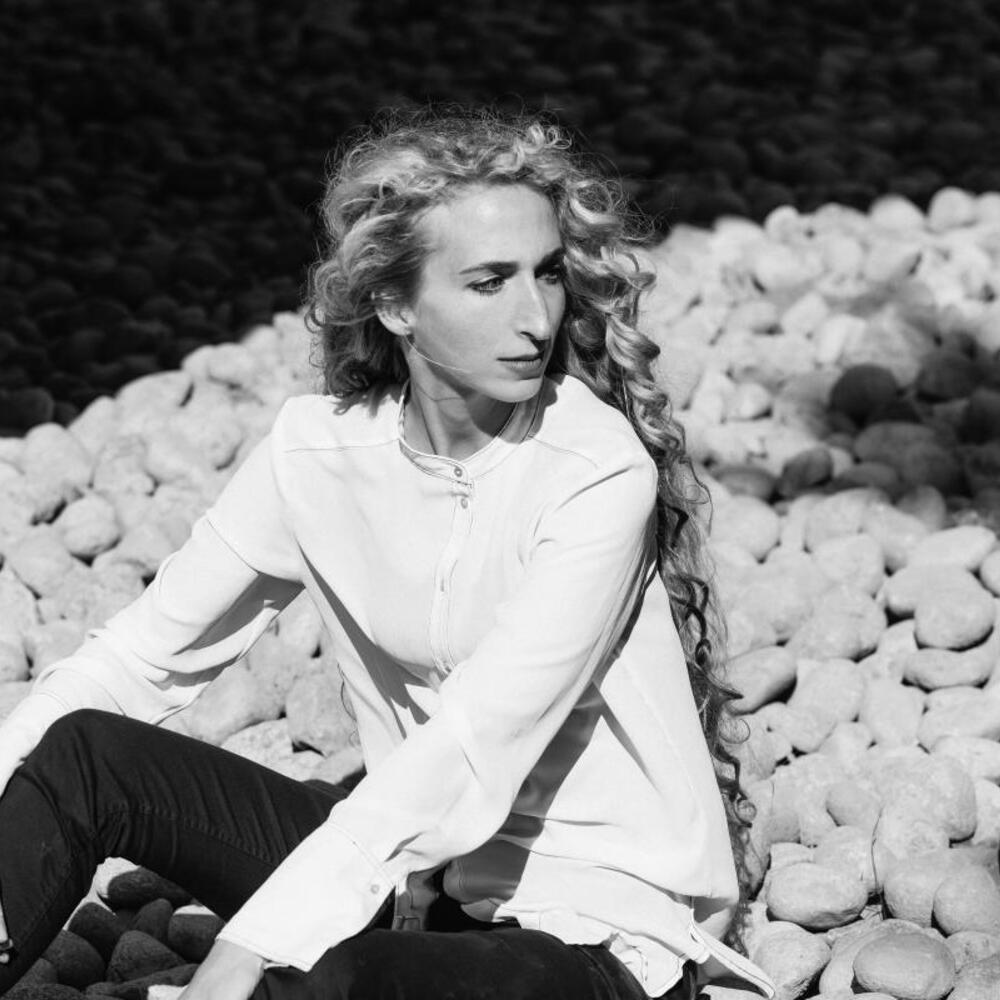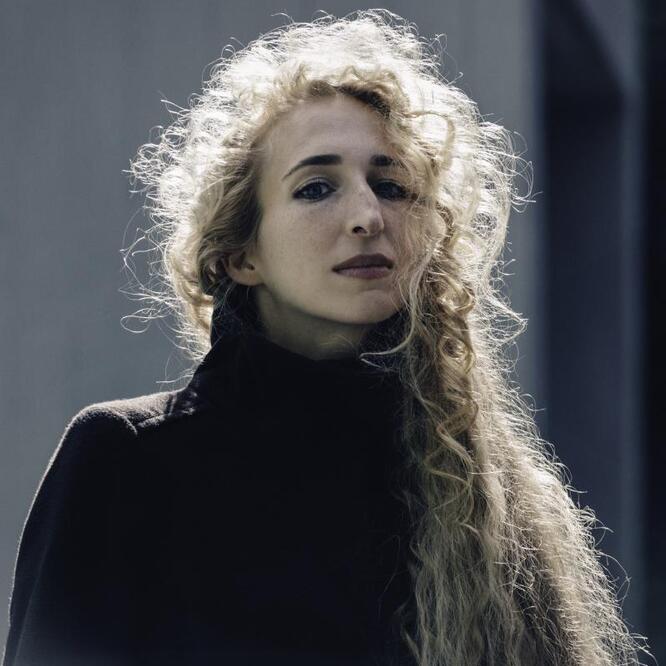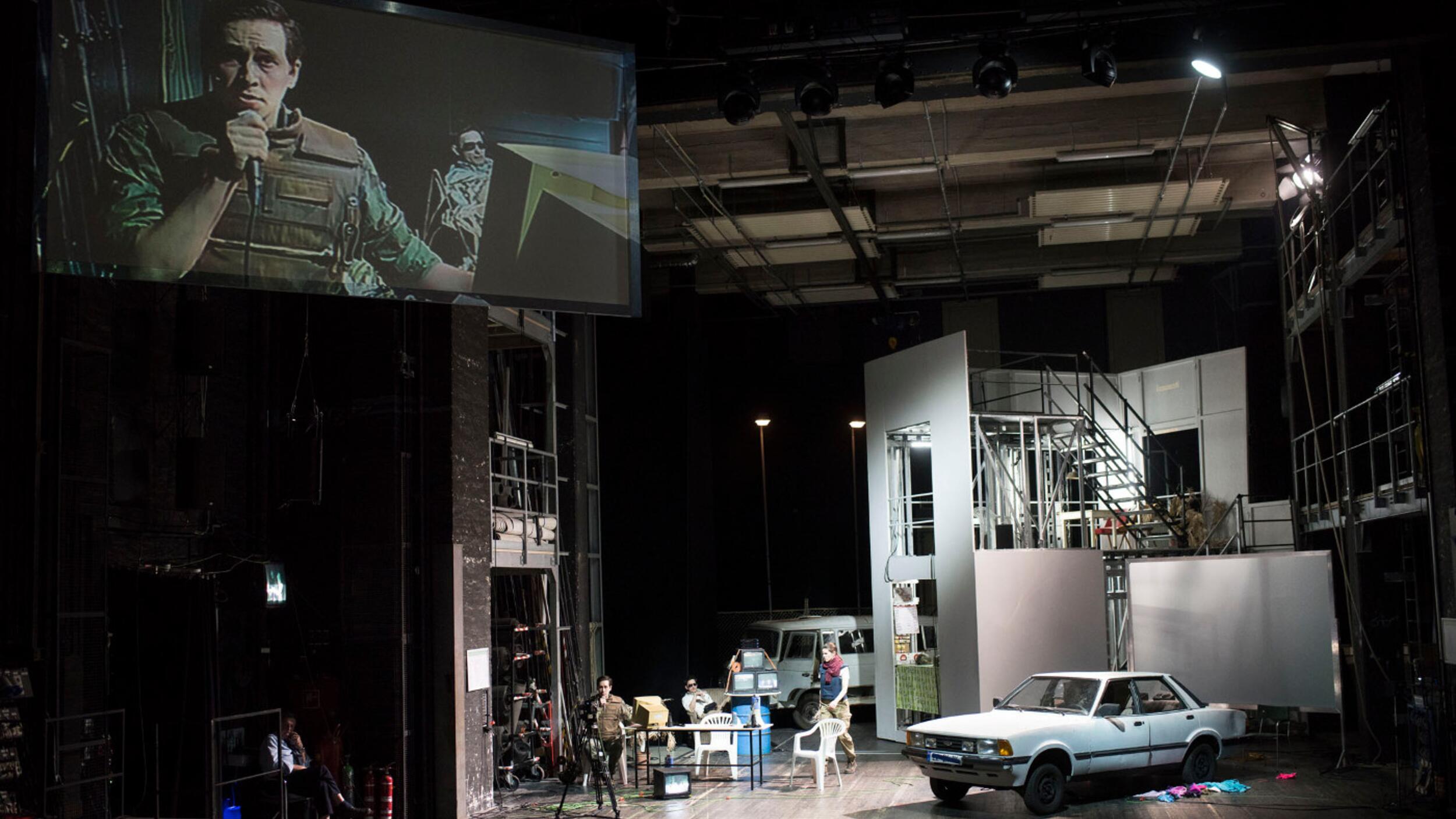
© Camille Blake
Deputy Department Head
Faculty
Univ.-Prof. Dipl.-Mus.-Päd.
Sarah Nemtsov
Sarah Nemtsov (*1980 in Oldenburg) is considered one of the most sought-after composers of her generation. She has received numerous prizes and scholarships, her works are performed at internationally renowned festivals and major houses, and she collaborates with renowned ensembles and orchestras. Nemtsov's catalog of works includes over 150 works in nearly every genre. She has been a Univ.-Prof.in for composition at the Mozarteum University since October 2022.
Sarah Nemtsov studied composition in Hanover and Berlin with Nigel Osborne, Johannes Schöllhorn and Walter Zimmermann, and she also studied oboe with Klaus Becker and Burkhard Glaetzner. She has received numerous prizes and grants, including the Busoni Composition Prize and the GEMA German Music Author Prize. In 2021 she was accepted as a member of the Saxon Academy of Arts and as a member of the Berlin Academy of Arts. She works with well-known ensembles and orchestras (WDR Orchestra, HR Symphony Orchestra, German Symphony Orchestra, RSO Vienna, Ensemble Intercontemporain, Ensemble Musikfabrik, Klangforum Vienna, ensemble mosaik, Ensemble Adapter, Neue Vocalsolisten Stuttgart etc.) and her works are performed at internationally renowned festivals performed - such as the Donaueschinger Musiktage, Darmstadt Summer Courses for New Music, Wien modern, ECLAT, Ultrasound, Musica, Bregenz Festival, Munich Biennale, Ruhrtriennale and many more Nemtsov's music captivates with sensitively studied setups, with complex and energetic textures, musical layers and interactions between acoustic instruments and electronics. Literature or other arts often play a role, and several compositions also touch on political or social issues. Her catalog raisonné includes over 150 compositions in almost all genres; from solo works to large orchestras, acoustic, electronic and multimedia, including several full-length operas. Her works have been published by Ricordi since 2016. In 2014, Sarah Nemtsov taught composition as a guest lecturer at the Hochschule für Musik Köln, and in the summer semester of 2018 she taught composition at Haifa University with a DAAD short-term lectureship. Since winter semester 2022 she has been a professor of composition at the Mozarteum University.

Wild inspiration. One of the most sought-after composers of her generation.
— Deutschlandfunk 2016 & RBB 2022
More press reviews
"Rampant inspiration. Sarah Nemtsov's music surprises with its playfulness and expressive power, which turns so directly to sounds and states. This is otherwise only known from areas of improvised music. Her works are meticulously constructed, and she puts the musical flow to the test with disturbances and detours. Also surprising is their reference to literature, which in no way slows down the freely proliferating and branching music. Literary inspiration, however, does not mean retelling. Sarah Nemtsov looks for 'the paradoxical, the absurd, the layered and the chaotic' and pulls musicians and listeners alike into cascades of sound events and whirlpools of excitement." (M. Entreß, Deutschlandfunk , 2016) “Nemtsov's music creates a continuous musical flow. It mixes the delicate and the brutal, the threatening and the promising… “ (Julia Spinola, Süddeutsche Zeitung, 2017) )
"[What] then happens in the old walls and is unleashed, that works, develops intensity, offers variety despite a persistent basic flow, doesn't get boring. An unchained intoxication of sound that opens up spaces for association, but above all it is based on the (self-)reflection of what has been composed and the independent power of individual instruments." (Joachim Lange, nmz , HAUS at the Ruhrtriennale 2022) "There may be more poetic opera evenings , also more humorous, but less established. [
…] The fact that it works in Halle is primarily thanks to Sarah Nemtsov's strong, absolutely unpretentious music, whose art character, even if it quotes Björk and Bach, is hardly noticeable after a while. Sound becomes space becomes time becomes reality. ( Christine Lemke-Matwey , Die ZEIT , on SACRIFICE, 2017)
"Sarah Nemtsov comes up with an incredible, unbelievable amount
of ideas…During these two hours there is not a dull moment musically…a real drama of hearing that is on offer…” (Uwe Friedrichs, Deutschlandfunk Musikjournal , on SACRIFiCE, 2017) “A music theater in a class” (Joachim Lange, Die deutsche Bühne , on SACRIFICE, 2017) “It is radical music, without making concessions to traditional listening habits, which is precisely what makes it very refreshing and has a liberating effect." (Mario-Felix Vogt, Berliner Morgenpost , on the orchestral work "dropped.drowned", DSO Berlin at the Ultrasound Berlin Festival 2020) "The composer moves here in the border area between noise and sound and in the transition between rhythm and melody , which outgrows the rhythmic. This music is extremely fragile. The fact that the harps and piano are electronically amplified leads to subtle color shifts in the sound of the classical orchestra. The pull of Nemtsov's sound inventions lasts until the end of the piece. A steady rhythm then throbs relentlessly, and when listening, a feeling of oppression sets in. There is no lack of exclamation marks in this music, and in order to have an effect it does not even need a reference to political circumstances." (Clemens Haustein, FAZ , January 2020) "The music remains suggestive at every moment, bringing the distant and indecipherable of what is happening on stage close fetches, writes it burning in the listening attention. Beyond all conventional parameters, the music achieves clarity and power, a suddenness and magic that seem to flow directly from the theatrical subject. Voice characters, noises, instrumental sounds (e.g. the cymbal, actually a Pannonian folklore instrument) seem to have been reinvented.” (Hans-Klaus Jungheinrich, Frankfurter Rundschau , on L'ABSENCE, 2012) “…the fact that it is about memories is communicated in every note, supported by everyday noises such as rustling leaves, the clatter of an old-fashioned typewriter, the jingle of a bunch of keys thrown on the floor. How Nemtsov integrates this into her delicate touches of prepared piano and melodica, harp, harpsichord and drums, lines of alto flute and bass clarinet is grandiose, testifies to an alert sense of sound precisely because it comes across as completely natural. You immediately believe that drama can happen in these hints. (Isabel Herzfeld, nmz, on the cycle ALONG WAY AWAY.Passagen 2012) "…in the adaptation of a Purcell aria, Sarah Nemtsov's "Orpheus falling" stood out for the originality of the intertwining of sound and content - falling objects rattle and clink, but here it is a tradition that should be let go. Nemtsov also impressed with the ensemble piece "white wide eyes", whose video playback of fixating, pursuing or obliterated looks corresponds to sounds of aggressive violence." (Isabel Herzfeld, nmz , 2015) "They cover all imaginable instrumentation forms: solo and orchestral compositions, piano pieces and Electronics, purely instrumental pieces, (semi-) scenic music with or without vocal participation, "grand opera", diverse ensemble formats, including such delightful combinations as viols with mp3 players, soprano and ukulele or prepared harp, piano, drums and humming top. The creative frenzy had its price. In order to be able to concentrate fully on composing, the trained oboist gave up a hopeful career as a soloist. An artistic double existence, such as that made prominent by Jörg Widmann, would not have been practicable for her in the long run. In “Wolves” (2012), Nemtsov also dealt with this dichotomy in the composition: the piano is consistently prepared with reed-making utensils and the oboist cuts the reed so short in the middle of the piece that no more sound is possible. Soloistic general break. Despite all the variety of compositional formats and stylistic turns, there are a few common threads that hold together Nemtsov's aesthetics, which are open to many but by no means arbitrary. […] The confused, contradictory and ultimately inseparable relationships between inside and outside, individual and collective or simply people and everyday reality affect Sarah Nemtsov existentially and are reflected in ever new compositional perspectives." (Dirk Wieschollek, nmz , Portrait, 2015) "[So] Sarah Nemtsov works in Running. out of tune only with two amplified harpsichords - one in mean tone, one in tempered tuning - and electronic playback: The result is a rhythmically complex interlocking of two differently tuned instruments and their resonance chambers, which are changed in the course of further detuning. […] Nemtsov also wrote the ambitious concertante composition Beyond its simple space (2018) for harpsichord and baroque orchestra with electronics and objects, which demands a certain amount of instrumental skill from the ensemble members: over the course of nine sections that merge into one another, the composer creates event fields with different tonal structures sometimes austere, sometimes almost exuberant sonority. They describe the stages of a musical process that, starting from strict four-quarter metrics, moves towards increasing tonal decay." (Stefan Drees, das Orchester , CD Review, 2019) "In the concert of the once again fabulous Neuen Vocalsolisten Stuttgart, the 1980 born Sarah Nemtsov with Hoqueti for voices and additional instruments, the ladies with drums, the gentlemen with double basses. The very concentrated, beautiful-sounding piece stole the show from the other three composers [...] alone, but not only because of the virtuoso dual activity." (Hartmut Lück, Neue Zeitschrift für Musik, Donaueschinger Musiktage 2011) "What a nice idea : Music as memory made into sound ... Sarah Nemtsov was inspired by literary texts, but above all by places. This is how "A Long Way Away" came about, a seven-part cycle... [it is] light, bright music that grows towards us from the instruments of the wonderful Ensemble Adapter... Sarah Nemtsov's music is always in love with detail; she prepares or amplifies instruments, lets them play unrelated instruments, retunes them... The only vocal piece "Hoqueti" appears powerful and expressive. The whispering is still threatening here." (Tilman Urbach, Fono Forum, CD review, 2012) “There are moments in music when you have the feeling of experiencing something that cannot be described in words. Some call it transcendence. Others would say more humbly, they are touched deep in their souls. At the second concert of the Nomos Quartet "From Far and Near" in Hanover's Pelikansaal, one of these moments of happiness occurred at the end of Sarah Nemtsov's string quartet "In Memory", which had premiered there. The beginning of Schubert's Andante fragment from the string quartet in C minor D 703 sounded tender, fragile, in a piano on the edge of the perceptible. Played with a mute and notated almost twice as slowly as in the original, it seemed as if the notes came from one other world. […] She abstracted the elements for her sensual, seemingly lyrical middle section from the formal language of the Romantic: a touching music of the soul created with contemporary means.” (Jutta Rinas, Hannoversche Allgemeine , 2008)
"[What] then happens in the old walls and is unleashed, that works, develops intensity, offers variety despite a persistent basic flow, doesn't get boring. An unchained intoxication of sound that opens up spaces for association, but above all it is based on the (self-)reflection of what has been composed and the independent power of individual instruments." (Joachim Lange, nmz , HAUS at the Ruhrtriennale 2022) "There may be more poetic opera evenings , also more humorous, but less established. [
…] The fact that it works in Halle is primarily thanks to Sarah Nemtsov's strong, absolutely unpretentious music, whose art character, even if it quotes Björk and Bach, is hardly noticeable after a while. Sound becomes space becomes time becomes reality. ( Christine Lemke-Matwey , Die ZEIT , on SACRIFICE, 2017)
"Sarah Nemtsov comes up with an incredible, unbelievable amount
of ideas…During these two hours there is not a dull moment musically…a real drama of hearing that is on offer…” (Uwe Friedrichs, Deutschlandfunk Musikjournal , on SACRIFiCE, 2017) “A music theater in a class” (Joachim Lange, Die deutsche Bühne , on SACRIFICE, 2017) “It is radical music, without making concessions to traditional listening habits, which is precisely what makes it very refreshing and has a liberating effect." (Mario-Felix Vogt, Berliner Morgenpost , on the orchestral work "dropped.drowned", DSO Berlin at the Ultrasound Berlin Festival 2020) "The composer moves here in the border area between noise and sound and in the transition between rhythm and melody , which outgrows the rhythmic. This music is extremely fragile. The fact that the harps and piano are electronically amplified leads to subtle color shifts in the sound of the classical orchestra. The pull of Nemtsov's sound inventions lasts until the end of the piece. A steady rhythm then throbs relentlessly, and when listening, a feeling of oppression sets in. There is no lack of exclamation marks in this music, and in order to have an effect it does not even need a reference to political circumstances." (Clemens Haustein, FAZ , January 2020) "The music remains suggestive at every moment, bringing the distant and indecipherable of what is happening on stage close fetches, writes it burning in the listening attention. Beyond all conventional parameters, the music achieves clarity and power, a suddenness and magic that seem to flow directly from the theatrical subject. Voice characters, noises, instrumental sounds (e.g. the cymbal, actually a Pannonian folklore instrument) seem to have been reinvented.” (Hans-Klaus Jungheinrich, Frankfurter Rundschau , on L'ABSENCE, 2012) “…the fact that it is about memories is communicated in every note, supported by everyday noises such as rustling leaves, the clatter of an old-fashioned typewriter, the jingle of a bunch of keys thrown on the floor. How Nemtsov integrates this into her delicate touches of prepared piano and melodica, harp, harpsichord and drums, lines of alto flute and bass clarinet is grandiose, testifies to an alert sense of sound precisely because it comes across as completely natural. You immediately believe that drama can happen in these hints. (Isabel Herzfeld, nmz, on the cycle ALONG WAY AWAY.Passagen 2012) "…in the adaptation of a Purcell aria, Sarah Nemtsov's "Orpheus falling" stood out for the originality of the intertwining of sound and content - falling objects rattle and clink, but here it is a tradition that should be let go. Nemtsov also impressed with the ensemble piece "white wide eyes", whose video playback of fixating, pursuing or obliterated looks corresponds to sounds of aggressive violence." (Isabel Herzfeld, nmz , 2015) "They cover all imaginable instrumentation forms: solo and orchestral compositions, piano pieces and Electronics, purely instrumental pieces, (semi-) scenic music with or without vocal participation, "grand opera", diverse ensemble formats, including such delightful combinations as viols with mp3 players, soprano and ukulele or prepared harp, piano, drums and humming top. The creative frenzy had its price. In order to be able to concentrate fully on composing, the trained oboist gave up a hopeful career as a soloist. An artistic double existence, such as that made prominent by Jörg Widmann, would not have been practicable for her in the long run. In “Wolves” (2012), Nemtsov also dealt with this dichotomy in the composition: the piano is consistently prepared with reed-making utensils and the oboist cuts the reed so short in the middle of the piece that no more sound is possible. Soloistic general break. Despite all the variety of compositional formats and stylistic turns, there are a few common threads that hold together Nemtsov's aesthetics, which are open to many but by no means arbitrary. […] The confused, contradictory and ultimately inseparable relationships between inside and outside, individual and collective or simply people and everyday reality affect Sarah Nemtsov existentially and are reflected in ever new compositional perspectives." (Dirk Wieschollek, nmz , Portrait, 2015) "[So] Sarah Nemtsov works in Running. out of tune only with two amplified harpsichords - one in mean tone, one in tempered tuning - and electronic playback: The result is a rhythmically complex interlocking of two differently tuned instruments and their resonance chambers, which are changed in the course of further detuning. […] Nemtsov also wrote the ambitious concertante composition Beyond its simple space (2018) for harpsichord and baroque orchestra with electronics and objects, which demands a certain amount of instrumental skill from the ensemble members: over the course of nine sections that merge into one another, the composer creates event fields with different tonal structures sometimes austere, sometimes almost exuberant sonority. They describe the stages of a musical process that, starting from strict four-quarter metrics, moves towards increasing tonal decay." (Stefan Drees, das Orchester , CD Review, 2019) "In the concert of the once again fabulous Neuen Vocalsolisten Stuttgart, the 1980 born Sarah Nemtsov with Hoqueti for voices and additional instruments, the ladies with drums, the gentlemen with double basses. The very concentrated, beautiful-sounding piece stole the show from the other three composers [...] alone, but not only because of the virtuoso dual activity." (Hartmut Lück, Neue Zeitschrift für Musik, Donaueschinger Musiktage 2011) "What a nice idea : Music as memory made into sound ... Sarah Nemtsov was inspired by literary texts, but above all by places. This is how "A Long Way Away" came about, a seven-part cycle... [it is] light, bright music that grows towards us from the instruments of the wonderful Ensemble Adapter... Sarah Nemtsov's music is always in love with detail; she prepares or amplifies instruments, lets them play unrelated instruments, retunes them... The only vocal piece "Hoqueti" appears powerful and expressive. The whispering is still threatening here." (Tilman Urbach, Fono Forum, CD review, 2012) “There are moments in music when you have the feeling of experiencing something that cannot be described in words. Some call it transcendence. Others would say more humbly, they are touched deep in their souls. At the second concert of the Nomos Quartet "From Far and Near" in Hanover's Pelikansaal, one of these moments of happiness occurred at the end of Sarah Nemtsov's string quartet "In Memory", which had premiered there. The beginning of Schubert's Andante fragment from the string quartet in C minor D 703 sounded tender, fragile, in a piano on the edge of the perceptible. Played with a mute and notated almost twice as slowly as in the original, it seemed as if the notes came from one other world. […] She abstracted the elements for her sensual, seemingly lyrical middle section from the formal language of the Romantic: a touching music of the soul created with contemporary means.” (Jutta Rinas, Hannoversche Allgemeine , 2008)
